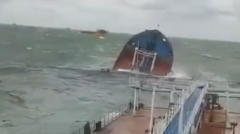Recent damage to two Russian oil tankers in the Black Sea has resulted in an oil spill and a rescue operation for stranded crew members, prompting investigations into potential negligent practices.**
Two Russian Tankers Suffer Catastrophic Damage in Black Sea Incident**

Two Russian Tankers Suffer Catastrophic Damage in Black Sea Incident**
Oil spill reported following two tankers running aground in Kerch Strait; rescue operations ongoing amid potential criminal investigations.**
Two Russian oil tankers have suffered significant damage in the Black Sea, leading to an oil spill, according to Russian authorities. Footage disseminated by the Southern Transport Prosecutor's Office depicted one of the vessels split in half, with visible oil streaks polluting the water’s surface. It is believed that both tankers drifted before running aground in the Kerch Strait, a strategic area that separates Russia from Crimea, a region annexed by Moscow in 2014.
At least one crew member has reportedly lost their life in this incident. Rescue efforts involving tugboats, helicopters, and over 50 personnel succeeded in saving 13 crew members from one of the tankers before the operation was disrupted by adverse weather conditions. Meanwhile, 14 crew members aboard the second tanker are reportedly equipped with adequate provisions for life support but remain stranded until the weather improves.
In response to the incident, President Vladimir Putin has mandated the formation of a working group, led by Deputy Prime Minister Vitaly Savelyev, to address the situation. Authorities have also initiated inquiries into possible criminal negligence linked to the wrecks. Shipping industry analyst Michelle Bockmann, speaking to the BBC, noted that the tankers belonged to the company Volgatanker and were fairly small, each carrying approximately 4,300 dead weight tonnes of oil, a markedly smaller volume than typical tankers used for international shipping, which can carry around 120,000 dead weight tonnes.
The Kerch Strait serves as a significant transit point for various Russian exports, including grain and crude oil. Notably, a similar incident occurred in 2007 when an oil tanker named Volgoneft-139 split during a storm, resulting in a substantial oil spill. Following the full-scale invasion of Ukraine by Russia in February 2022, Russian oil imports have faced severe sanctions from its allies, leading to criticism regarding the use of a so-called ghost fleet of tankers, often seen as poorly maintained and uninsured, to bypass sanctions. However, analyst Bockmann asserted that the tankers involved in the current accident do not appear to belong to that fleet.




















